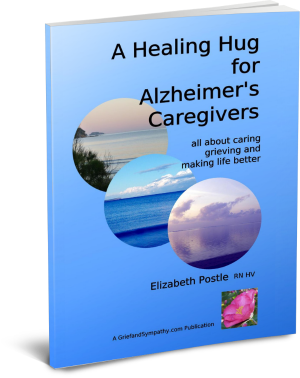7 Warning Signs You Have Alzheimer's Spouse Grief
By Elizabeth Postle, RN, HV, FWT.
If you are caring for someone with Alzheimer's or dementia, the chances are that you have no time for yourself, are feeling overwhelmed, exhausted and frustrated and are just lurching from crisis to crisis.
Our pages of advice on coping with caregiving should help you to feel calmer, more in control and proud of the way you are coping. We aim to help you to regain your quality of life, and enjoy some special moments with your loved one.
One of the first things that you might not realise is that, in all likelihood, much of what you are feeling is grief. See whether you relate to the feelings below, and then read on to find ways to cope below.
If you have any of these signs, you may be grieving. Many people don't realise that what they are suffering is grief when their spouse has Alzheimer's disease. Sometimes it is called "anticipatory grief".
Are you:
1. Feeling tearful but not sure why?
2. Stressed and overtired?
3. Not sleeping well?
4. Not eating well?
5. Feeling a bit numb, or fearful or anxious?
6. Getting confused or forgetful?
7. Not coping as you used to?
All these and many more can be signs that you are suffering from grief as well as the day to day stress of living with a person with Alzheimer's or dementia.
Grief and loss can occur when the loved one is still alive, yet their personality and individuality has gone.
Your spouse with dementia or Alzheimer's is gradually changing before your eyes and is becoming more and more dependent. You grieve for the loved one you had, whilst caring for the totally dependent person they have become.
This long, slow loss of a loved one is a painful, difficult time when you are also coping with their home care.
They are still with you, they have the same smile, they may appear outwardly normal, but the ability to cope alone is gone and they become totally dependent.
Sadly, with all the focus on the loved one with Alzheimer's, the fact that you are suffering grief for your spouse is often forgotten.
When Your Spouse No Longer Recognises You
The worst time is when your loved one does not recognise you or their children any more. It is a heart breaking time. Many family members find it too upsetting to visit when this happens. This can cause friction in families. It is another time to realise that people grieve in different ways.
There is grief because the person you loved, the personality, has gone. Yet the person is still there. Friends and neighbours don’t realise that you and your family are grieving, there is not the same support as when someone dies.
Your children are also suffering grief. They are gradually losing one parent to dementia, and the other is in a constant state of crisis, coping from day to day, and needs an enormous amount of support. Suddenly the roles are reversed and the children have to support the parents.

Ways to Find Dementia Support
- Don't be too proud to ask for help.
- Take a break so that you can recharge your batteries. You are now the most important person in the family, so finding time for yourself is essential. See if you can get a short holiday, there may be respite care available in your area, or get a family member to take over the caring for a short period.
- As each crisis hits, family, doctors, psychiatric nurses, social workers and day care centres can all give support. Don't be afraid to ask.
- There is a lot to organise, and it is important to take care of yourself as well as your spouse.
- Talk to family and friends about your concerns, and arrange the help you need. Don't try to do it all yourself.
- You may need help to organise your finances or housing arrangements.
- Day care might need to be put in place. Talk to your doctor or social worker about the support that is available for you.
- Accept all offers of help, as you have to look after yourself so that you can keep well and care for your loved one. Spend time with a good friend and have a laugh. Go out and enjoy yourself to have a break. You are doing an amazing job and need all the help you can get.
- Read my book 'A Healing Hug for Alzheimer's Caregivers' which will help you to understand and cope with difficult situations, and find ways to get respite for yourself. It will help you to regain some quality of life, and enjoy some precious moments with your loved one. Click here to find out more about the book.
When Home Care Is No Longer Possible
When the painful decision comes that it is no longer possible to cope at home and your spouse goes into care, don't feel guilty. Be proud that you and your family have coped for as long as you have. It is not easy.
The demands continue though. Daily visits to the care home, combined with the emptiness of suddenly being home alone can take a toll on the one left behind. There is a lot of advice and information in my book about making the most out of visits to the care home and activities you can do to help keep your spouse content.
Grief for Your Spouse with Alzheimer's Is Real
It helps to accept that although your loved one is still there, you are nevertheless suffering a bereavement and grieving for the loss of your partner.
Instead you have a dependent child to wash, dress and feed. You are now a full-time carer as well as having responsibility for the entire household.
Keep Up with Your Friends
If you feel that some friends have deserted you, get in touch with them again.
Some people are simply afraid of psychiatric illness and don't know what to say or do. So they stay away.
It is important for you to learn to ask for help and support. My book will help you to do that, and help you to realise what an incredible job you are doing.
To learn more:
"A Healing Hug for Alzheimer's Caregivers: all about caring, grieving and making life better"
If you're feeling frazzled, depressed and unable to cope, my book 'A Healing Hug for Alzheimer's Caregivers' will enable you:
- to take control,
- to cope with difficult situations with patience and humour, and
- to get some relief from the feelings of grief.
Soon you will be able to shake off any feelings of guilt and be proud of the way you are coping.
Click here to read the full contents list and order
Or scroll down to watch my video where I talk about caring for loved ones with dementia and visit many more pages of information about being a caregiver for someone with Alzheimer's.
In this video I talk about caring for people with Alzheimer's and dementia.
Related Pages:
What is the difference between Alzheimer's and Dementia?
Getting a diagnosis may have been delayed for many years and the knowledge of what is wrong can either come as a shock or a relief.
Read more about coping with the diagnosis of Alzheimer's disease or dementia
Many may find it difficult to accept something is going wrong, and are unable to ask for help.
To help you cope with your loved one at home – read:
Understanding Alzheimer’s behaviour changes
Tips for Alzheimer’s Caregivers
Activities for Loved Ones with Alzheimer’s
The following pages will help you recognise some of the symptoms and accept when it is time to get more help –
Why is Caregiver Grief after Death Such a Shock?
More Uplifting and Helpful Articles:
"Is Alzheimer's Always Depressing? I Think Not" - An Article from the Huffington Post
Read how our guest writer Ankita coped with losing a loved one to Alzheimer's
Alzheimer’s support groups
Anticipatory grief in the spouses of people with Alzheimer's is very common and often not recognised.
Alzheimer's support groups can be helpful when you are grieving for your spouse with dementia. It is good to talk to others who are experiencing the same problems and understand what you are going through. Your doctor or day care provider may be able to put you in touch with your nearest groups, or you can search online.
Find a support group in the USA
Find a support group in the UK
Australian support groups are listed state by state, so do an internet search for “Alzheimer’s support groups, NSW” or whichever state you are in.
- Grief and Sympathy Home
- Alzheimer's Spouse Grief
Where to get help:
Have You Considered One-on-One Online Grief Counseling?
Get Expert and Effective Help in the Comfort of Your Own Home
The following information about online counseling is sponsored by 'Betterhelp' but all the opinions are our own. To be upfront, we do receive a commission when you sign up with 'Betterhelp', but we have total faith in their expertise and would never recommend something we didn't completely approve.
Do you feel alone and sad with no support and no idea how to move forward? It can be tough when you are stuck in grief to find the motivation to get the most out of your precious life.
Online counseling can help by giving you that support so you don't feel so alone. You can have someone to talk to anytime you like, a kind and understanding person who will help you to find meaning in life again, to treasure the memories of your loved one without being overwhelmed and to enjoy your activities, family and friends again.
- Simply fill out the online questionnaire and you will be assigned the expert grief counselor most suitable for you. It only takes a few minutes and you don't even have to use your name.
- Pay an affordable FLAT FEE FOR UNLIMITED SESSIONS.
- Contact your counselor whenever you like by chat, messaging, video or phone.
- You can change counselor at any time if you wish.
- Click here to find out more and get started immediately.
- Or read more about how online counseling works here.
Sales from our pages result in a small commission to us which helps us to continue our work supporting the grieving.
Hypnosis for Grief - 10 Ways It Can Help You
Try a gentle hypnotherapy track to relax the mind. Learn how self-hypnosis can help you cope with grief at any time of the day or night.






